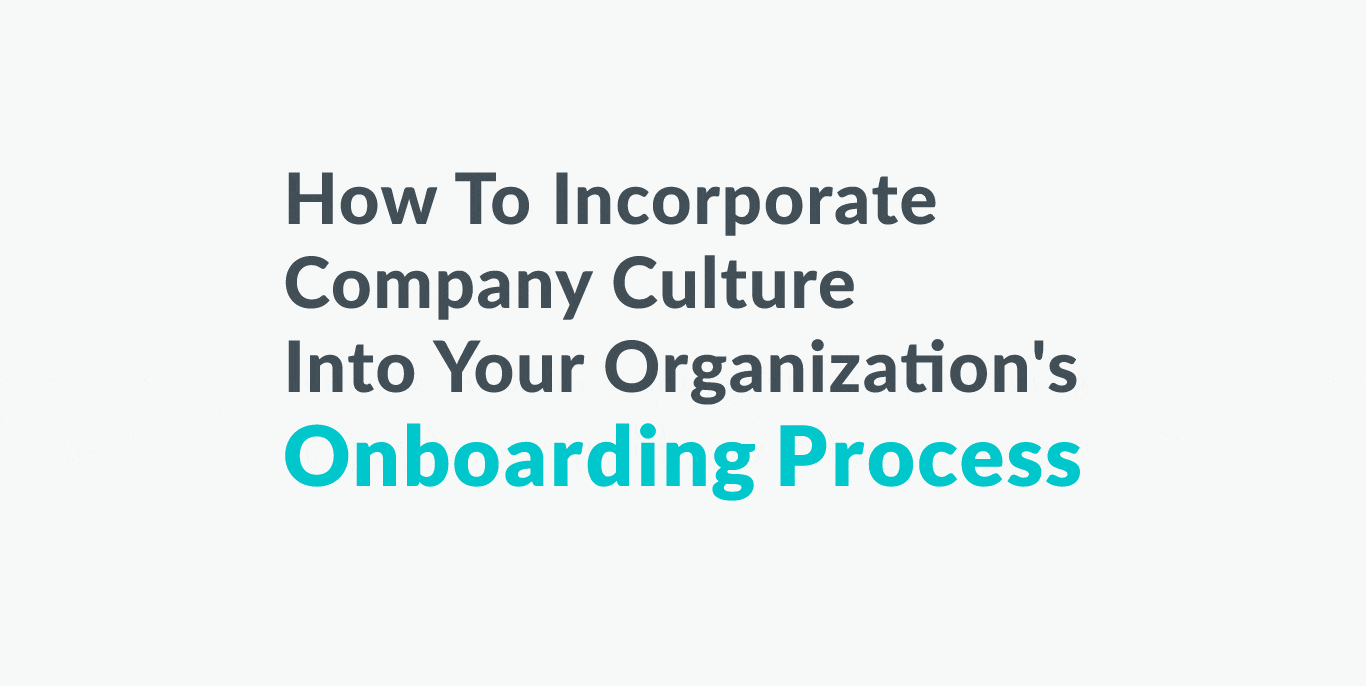How to Incorporate Company Culture into Your Organizations Onboarding Process

First impressions are incredibly important for many reasons, but the main reason is that they can have a lasting impact on an individual’s long-term perception of a person or thing. This concept is true for most social situations and experiences, but none more so than when it comes to a new employee’s first impression of his or her new job and company. What’s crucial is that in most cases a person’s first impression is solidified during the onboarding process or at times much earlier.
It’s critical for HR leaders to incorporate company culture into their onboarding process in an effort to ensure that new employees assimilate the culture and understand what’s expected of them and their colleagues.
A company must flow in the same direction in order to work most effectively, as articulated by Slack’s CEO Stewart Butterfield in this WSJ video of “Drawing the Future of Work,” and in many ways a company’s culture is the string that ties that movement together.
Now that it’s apparent how important company culture is to the bottom line, let’s review a few effective ways to incorporate company culture into your organization’s onboarding process.
Early Communication
First things first, all initial communication between an HR staff member and a potential new employee should consist of warmth and emotional intelligence. The communication needs to be welcoming and indicative of the joy that a day in the life of a company employee would entail.
For phone calls, exude that same warmth, and make sure to be patient with the employee’s responses. Let the individual feel heard and listened to. Spend sufficient time walking the person through your company’s culture, but also learn more about what the person wants out of your company’s culture. Believe it or not, speaking about culture says a lot more than you think.
In addition, share different aspects of your company’s intranet with this person; this way he or she can start to learn about the inner workings of the company and what keeps it moving forward.
Team Introductions
One aspect of company culture that can have a big impact on new employees is whether there is a hierarchy within a company--and how that hierarchy manifests through communication between team members. One way to mitigate the feeling of an intangible hierarchy is by facilitating team introductions between new employees and established employees. A new employee in this situation will feel at ease knowing that he or she can speak to higher ups and not feel inferior.
In many older organizations that have insufficient company culture, for example, there is a clear line between employees that have just started and those that have been there for years. That line is never crossed, and many HR experts would argue that the divide causes poor communication and silos, as covered in this Forbes article. What’s also crucial is that you introduce your new hire with precision and excitement to the company.
Team Building Activities
Within an employee’s first two weeks there should be team building activities planned, particularly with other teams. Team building will show the new employee that interactions and social engagement is crucial to your company’s growth.
The most fundamental idea is to step out of the office and grab lunch paid for by the company. This will illustrate to the employee that, yes, business is key, but so is connecting on a deeper, personal level. It’s not just about productivity, but how we work with each other to accomplish the most productivity.
This concept rings true for a new full-time employee or contractor. When employees can see that there is a sustained respect for any contributor to your team, that feeling will resonate and make the perception of company culture feel more purposeful.
Staying Organized
One component that will help HR with the entire onboarding process, from start to finish, is utilizing the right tool. Onboard by HR Cloud is a tool that can enhance the overall process in particular.
The reason why an organization can deliver a large dose of positive company culture is because organization leads to more communication on all levels. Said differently, organization creates streamlined communication, which in turn gives people the impression they are all on the same equal playing field.
Bottom line, that’s what company culture needs to do--it needs to make everyone feel heard, listened to, cared for, acknowledged, respected, and understood. And that starts and ends with every new employee that walks through your company’s doors.
Keep Reading
Retention Reset: How to Keep Your Best Talent in 2025
More employees are walking away from their jobs in 2025 not just for better pay, but for
Remote Onboarding Done Right: A Step-by-Step Guide for HR Teams
Remote onboarding is the process of welcoming new employees who work from home or

